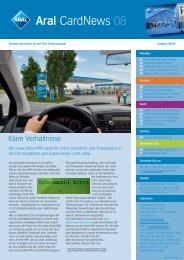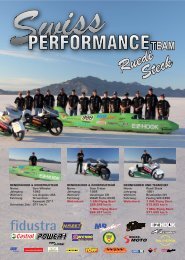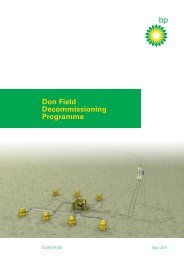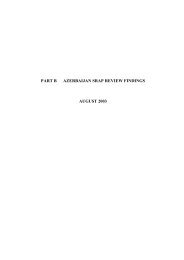Create successful ePaper yourself
Turn your PDF publications into a flip-book with our unique Google optimized e-Paper software.
Learning Centre’s wide range <strong>of</strong> courses,<br />
topping up <strong>the</strong>ir knowledge via regional<br />
science learning centres and by making use<br />
<strong>of</strong> web-based programmes.<br />
However, <strong>the</strong> ambitions for Project<br />
Enthuse do not stop <strong>the</strong>re. The National<br />
Science Learning Centre is also training<br />
scientists – including some from Project<br />
Enthuse sponsor companies – in how to<br />
work with schools. “We want scientists who<br />
are passionate about <strong>the</strong>ir subject to engage<br />
with teachers and pupils, to share <strong>the</strong>ir<br />
knowledge <strong>of</strong> science, and integrate it into<br />
<strong>the</strong> classroom through exciting, practical<br />
work,” explains Miranda Stephenson,<br />
director <strong>of</strong> <strong>the</strong> National Science Learning<br />
Centre programme. “It’s important that<br />
pupils meet scientists, gain a wider picture<br />
<strong>of</strong> science in society, see that <strong>the</strong>re are<br />
opportunities for well-paid, interesting jobs<br />
in science and also have role models.”<br />
So what do teachers think <strong>of</strong> Project<br />
Enthuse? John Hamilton-Cox, a chemistry<br />
teacher from Nower Hill High School in<br />
north London comments, “Without <strong>the</strong><br />
Project Enthuse award, I couldn’t have come<br />
on this course. We have a science faculty <strong>of</strong><br />
17 people. Just two people’s training here<br />
would have used up <strong>the</strong> department’s total<br />
annual continuing pr<strong>of</strong>essional<br />
development budget.” Ian Howes, head <strong>of</strong><br />
science at Welland Park Community<br />
College in Market Harborough is also<br />
positive: “It’s nice to be treated like a<br />
pr<strong>of</strong>essional in pr<strong>of</strong>essional surroundings.<br />
I’ve gained ideas that I can use in my first<br />
lesson. I’ll also share a lot <strong>of</strong> <strong>the</strong> concepts<br />
with <strong>the</strong> rest <strong>of</strong> my colleagues. This is a great<br />
opportunity to re-energise my department.”<br />
External evaluators<br />
The big question is can Project Enthuse<br />
make a difference? The National Science<br />
Learning Centre is employing external<br />
evaluators to measure <strong>the</strong> impact <strong>of</strong> its<br />
courses. However, its internal evaluations<br />
look extremely encouraging. Most courses<br />
include two residential periods with<br />
teachers returning to report on <strong>the</strong><br />
changes <strong>the</strong>y have implemented. National<br />
Science Learning Centre evaluators <strong>the</strong>n<br />
rank <strong>the</strong>ir success. “In <strong>the</strong> academic year<br />
2006-2007, some 73% <strong>of</strong> participants had a<br />
high impact in <strong>the</strong>ir schools,” notes<br />
Stephenson. “This increased to 90% in<br />
2007-2008. What we’re seeing is that<br />
changes are happening.”<br />
If science teachers are able to encourage<br />
more students to show an interest in science,<br />
<strong>the</strong>n a virtuous circle <strong>of</strong> benefits could result.<br />
A greater number will go on to study science<br />
in higher education and <strong>the</strong>re will be a<br />
greater pool <strong>of</strong> talent entering science-based<br />
careers. Some will select teaching as a career,<br />
filling <strong>the</strong> demand for specialist teachers in<br />
physics and chemistry. They, in turn, will<br />
enthuse and engage <strong>the</strong> next generation <strong>of</strong><br />
pupils about <strong>the</strong> value <strong>of</strong> science.<br />
Even if pupils decide against studying<br />
science at a higher level, Project Enthuse<br />
can still have an impact. “One <strong>of</strong> our aims is<br />
to improve scientific literacy,” explains<br />
Holman. “It’s important we all have a basic<br />
understanding <strong>of</strong> science so that we can<br />
make informed decisions about issues<br />
which affect everyone in society, such<br />
as genetically modified crops and stem<br />
cell research.”<br />
But how long will it take to see more<br />
students opting for fur<strong>the</strong>r study and<br />
careers in science? Castell believes that<br />
Project Enthuse’s five years <strong>of</strong> funding is<br />
sufficient time to make an impact. “My<br />
hope is that Project Enthuse will be big<br />
enough to make a difference and good<br />
enough to be copied,” he says. “If we prove<br />
its worth, we can go back to <strong>the</strong><br />
government and show that high-quality<br />
continuing pr<strong>of</strong>essional development is a<br />
requirement for mainstream education –<br />
not just in science, but for all subjects.” ■<br />
Informed decisions: one <strong>of</strong> <strong>the</strong> aims <strong>of</strong><br />
Project Enthuse is to improve scientific<br />
literacy so that society can make<br />
informed decisions about issues such<br />
as genetically modified crops.<br />
<strong>BP</strong> MAGAZINE Issue 1 2009 23



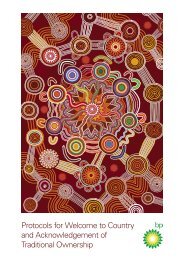
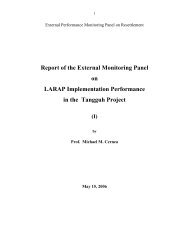
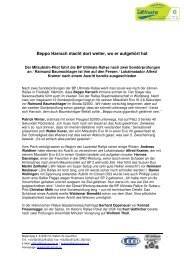
![[PDF] Deepwater Horizon: Accident Investigation Report - BP](https://img.yumpu.com/51697031/1/190x245/pdf-deepwater-horizon-accident-investigation-report-bp.jpg?quality=85)

